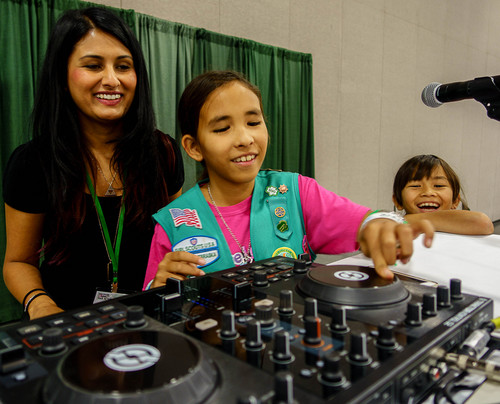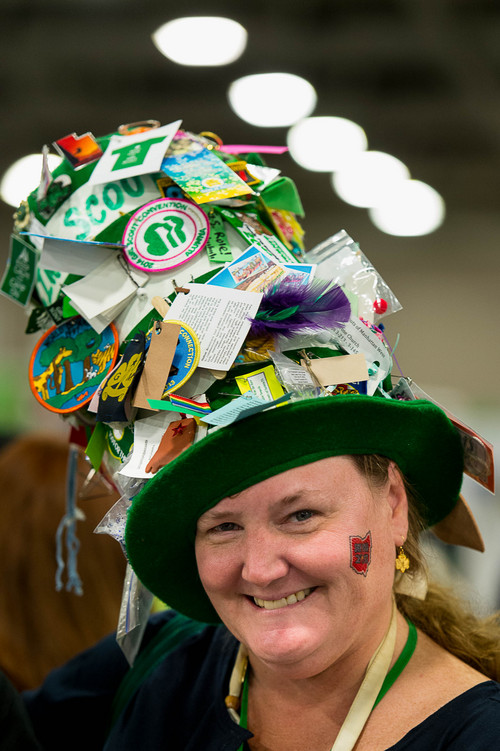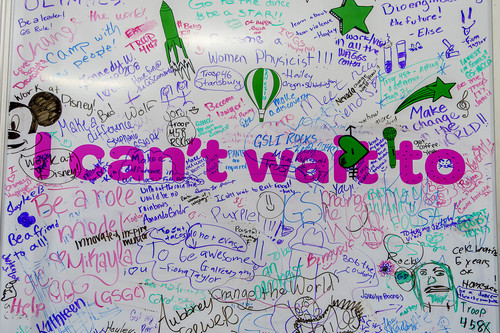This is an archived article that was published on sltrib.com in 2014, and information in the article may be outdated. It is provided only for personal research purposes and may not be reprinted.
Ella Murphy took a turn driving the Mars rover on Saturday, but not without a mishap.
"I crashed the tunnel," said the 8-year-old from Riverton, standing near a mock NASA control center at this week's Girl Scouts conference in downtown Salt Lake City.
She also swapped cookies and visited a booth for a basic sewing lesson. Six fellow troop members and hundreds of girls from across the country joined in at various stations this weekend at the Salt Palace Convention Center.
The organization is encouraging its youngest members to grab a remote control or a set of Legos and consider a science or tech career. But its trademark crafts and baked goods are still sticking around.
"Science is in everything that we do," said Lisa Hardin-Reynolds, vice president of programming, adding that it is crucial for the national organization to promote careers considered to be male-dominated. "Girls can do it just as well, or better."
The variety "is just saying the sky's the limit," said Angie Park, whose 8-year-old daughter also belongs to Ella's troop. "That's what Girl Scouts is about. It's not that you can only do science or math. It's discovering what you can do."
Still, many were gearing up to hear Kristen Gil, Google's vice president of operations, headline the conference Saturday evening. Others heard race car driver Simona de Silvestro stress sciences as worthy disciplines.
In 2004, the national organization launched its "Girls Go Tech" initiative, said Wendy Holforty, an engineer and project manager at the NASA Ames Research Center in California's Silicon valley. A Girl Scout of 50 years, she has volunteered for the past three conferences.
But, she notes, science, technology, engineering and math—often labeled collectively as STEM—aren't the best fit for each student.
"While STEM is a big buzzword in education today, it's not for everyone," she said, pausing to hand out remote controls for the miniature mock rovers — warning troop members they were on their own if the machinery malfunctioned.
"If a girl comes up to me and says, 'I hate robots'" when she hands in her remote control, "I'm doing my job." But many go in the opposite direction, joining a Girl Scouts robotics team called "Space Cookies" in its competitions, including national championships. Many have gone on to win college scholarships, go to top schools and work as engineers.
Ella's mother, Charlotte Murphy, praised such paths for young women but said she's not forcing it for her own daughter.
"I'm not pushing her toward NASA. I'm not pushing her toward the sewing machine," she said. "I'm giving her opportunities and letting her choose."
As a business student in college, Murphy took elective physics courses and is considering going back for a nursing degree. No one pointed out sciences to her as a possible career.
"I hope my daughter is exposed to more," she said.
For her part, the 8-year-old "never liked Barbies or dolls" but quickly took to Legos, her mother said.
"I've been working on a Lego city, a train," Ella Murphy added. "You can build anything you want."
Fellow troop member Havyn Saunders chimed in. "I want to be an engineer," she said. "It seems so cool a job." The two often build together after school and on weekends.
Emma Schlagel, a 16-year-old Girl Scout from Ogden, helped at the rover station Saturday. She likes designing science fair projects such as wind tunnels and airplane wings, she said.
"I've just always liked putting stuff together and seeing how it works. Whenever something isn't working, you can always just tweak it or go with the flow," Schlagel said.
She isn't sure what she wants to study or do for a career, she said, but added she thinks NASA is pretty cool.
"Girl Scouts kind of have a reputation of cookies and badges," she said. "This is just more empowering. "
Twitter: @anniebknox







